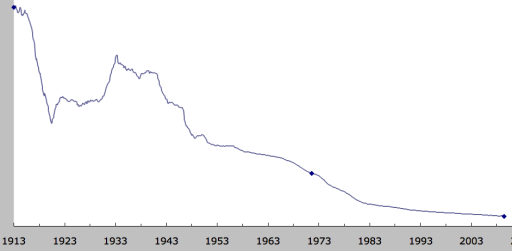« Reading List: We Are Doomed | Main | Reading List: The Year I Owned the Yankees »
Sunday, October 25, 2009
Reading List: End the Fed
- Paul, Ron. End the Fed. New York: Grand Central, 2000. ISBN 978-0-446-54919-6.
-
Imagine a company whose performance, measured over almost a century
by the primary metric given in its charter, looked
like this:

Posted at October 25, 2009 23:31